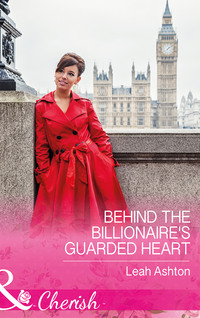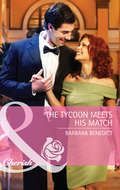Raamatut ei saa failina alla laadida, kuid seda saab lugeda meie rakenduses või veebis.
Loe raamatut: «Behind The Billionaire's Guarded Heart»
Falling for her mysterious boss...
When Australian heiress April Molyneux is left brokenhearted, she looks for a new start in London. Determined to stand on her own two feet, she finds herself working for the reclusive yet sexy billionaire Hugh Bennell.
Hugh likes his life—and his emotions—uncomplicated, but meeting glamorous April changes everything. Hugh doesn’t do relationships, and April wants to keep the independence she’s worked so hard for. But with these sparks flying...resistance might be futile!
Hugh was still so close. Closer than he’d ever been before.
Tall enough and near enough that he needed to look down at her and she needed to tilt her chin up.
April explored his face. The sharpness of his nose, the thick slash of his eyebrows, the strength of his jaw. This close she could see delicate lines bracketing his lips, a freckle on his cheek, a rogue grey hair among the stubble.
He was studying her, too. His gaze took in her eyes, her cheeks, her nose. Her lips.
There it was.
Not subtle now, nor easily dismissed as imagination as it had been down in his basement apartment. Or every other time they’d been in the same room together.
But it had been there, she realizsed. Since the first time they’d met.
That focus. That...intent.
That heat.
Between them. Within her.
It made her pulse race and caused her to lost in his gaze when he finally wrenched his away from her lips.
Since they’d met his eyes had revealed little. Only enough for her to know, deep in her heart, that he wasn’t as hard and unfeeling as he so steadfastly attempted to be.
Behind the Billionaire’s Guarded Heart
Leah Ashton

RITA® Award–winning author LEAH ASHTON never expected to write books. She grew up reading everything she could lay her hands on—from pony books to the backs of cereal boxes at breakfast. One day she discovered the page-turning, happy-sigh-inducing world of romance novels...and one day, much later, wondered if maybe she could write one, too.
Leah now lives in Perth, Western Australia, and writes happy-ever-afters for heroines who definitely don’t need saving. She has a gorgeous husband, two amazing daughters and the best intentions to plan meals and maintain an effortlessly tidy home. When she’s not writing, Leah loves all-day breakfast, rambling conversations and laughing until she cries. She really hates cucumber. And scary movies. You can visit Leah at www.leah-ashton.com or Facebook.com/leahashtonauthor.
MILLS & BOON
Before you start reading, why not sign up?
Thank you for downloading this Mills & Boon book. If you want to hear about exclusive discounts, special offers and competitions, sign up to our email newsletter today!
Or simply visit
Mills & Boon emails are completely free to receive and you can unsubscribe at any time via the link in any email we send you.
For Jen—who writes beautiful messages in cards,
talks with her hands and giggles at all my jokes.
Thank you for all your help with this book,
and for your belief in my writing.
You’re fabulous, Jen. I miss you.
Contents
Cover
Back Cover Text
Introduction
Title Page
About the Author
Dedication
PROLOGUE
CHAPTER ONE
CHAPTER TWO
CHAPTER THREE
CHAPTER FOUR
CHAPTER FIVE
CHAPTER SIX
CHAPTER SEVEN
CHAPTER EIGHT
CHAPTER NINE
CHAPTER TEN
CHAPTER ELEVEN
CHAPTER TWELVE
CHAPTER THIRTEEN
CHAPTER FOURTEEN
CHAPTER FIFTEEN
EPILOGUE
Extract
Copyright
PROLOGUE
THE SUNSET WAS PERFECT—all orange and purple on a backdrop of darkening blue. Just the right number of clouds stretched their tendrils artistically along the horizon.
The beach, however, was not so perfect.
It had been a warm Perth day, so April Molyneux hadn’t been alone in her plans for a beachside picnic dinner. Around her, people congregated about mounds of battered fish and chips on beds of butcher’s paper. Others had picnic baskets, or brown paper takeaway bags, or melting ice cream cones from the pink and white van parked above the sand dunes.
There were beach towels everywhere, body boards bouncing in the waves, children building sandcastles, women power walking along the beach in yoga pants, gossiping at a mile a minute. Then a football team jogged by, shirtless and in matching deep purple shorts.
April wanted to scream. This was not what she’d planned.
This was not a private, romantic, beachside tête-à-tête.
Evan lay sprawled on their picnic blanket, his back turned away from April as he scrolled through his phone.
Today was their wedding anniversary. Three years.
#anniversary #threeyears #love #romance
Right now April felt like dumping the contents of the gourmet picnic box she’d ordered all over his head—sourdough baguettes, cultured butter, artisan cheeses, muscatels and all.
‘Do we have to do this?’ Evan asked, not even looking at her.
‘You mean spend time with your wife on your anniversary?’ Her words were sharp, but April’s throat felt tight.
The sea-breeze whipped her long blonde hair across her eyes, and she tucked it back behind her ears angrily. She sat with her legs curled beneath her, a long pale pink maxi-dress covering her platinum bikini. She stared daggers at Evan’s back. His attention was still concentrated on the screen of his phone.
‘You know that isn’t what I meant.’
She did. But she’d spent weeks leading up to today, posting photos of their wedding to her one point two million followers.
#anniversary #threeyears #love #romance
She’d organised for the Molyneux family jet to take them up north, up past Broome. She’d found the perfect—perfect—private beach. She’d had the stupid picnic box couriered up from Margaret River, and she’d had her assistant organise a gorgeous rainbow mohair picnic blanket, complete with a generous donation to the Molyneux Foundation.
And then Evan had called from work as she’d been packing her overnight bag. He’d asked if they could cancel their trip. He didn’t really feel like going, and could they stay home instead?
Coming to this beach had been the compromise.
It wasn’t even about the beach, really. Just the photo.
All he needed to do was smile for the camera and then they could go home and eat their fancy picnic in front of the TV. Or order pizza. Whatever. It didn’t matter. And Evan could eat silently, then retreat to his study and barely talk to her for the rest of the evening.
Just as he did most nights.
Again, April’s throat felt tight.
Finally Evan moved. He shifted, sitting up so he could face her. He took off his sunglasses, and for some reason April did too.
For the first time in what suddenly felt like ages he looked directly at her. Really intensely, his hazel eyes steady against her own silvery blue.
‘I don’t think we can do this any more,’ he said. Firmly, and in a way that probably should have surprised her.
April pretended to misunderstand. ‘Come on—it’s just a stupid photo. We need to do this. I have contractual obligations.’
For product placement: The mohair blanket. The picnic box. Her sunglasses. Her bikini.
Donations to the Molyneux Foundation were contingent on this photograph.
Evan shook his head. ‘You know what I’m talking about.’
They’d started marriage counselling only a year after their wedding. They’d stopped trying for a baby shortly afterwards, both agreeing that it was best to wait until they’d sorted things out.
But they hadn’t sorted things out.
They’d both obediently attended counselling, made concerted efforts to listen to each other...but nothing had really changed.
They still loved each other, though. They’d both been clear on that.
April knew she still loved Evan. She’d loved him since he’d asked her to his Year Twelve ball.
To her, that had been all that mattered. Eventually it would go back to how it had used to be between them. Surely?
‘I’ll always love you, April,’ Evan said, in a terribly careful tone that she knew he must have practised. ‘But I don’t love you the way I know I should. The way I should love the woman I’m married too. You deserve better, April.’
Oh, God.
The words were all mashed together, tangled up in the salty breeze. All April could hear, repeated against her skull, was: I don’t love you...
His lips quirked upwards. ‘I guess I deserve better, too. We both deserve that love you see in the movies, or in those books you read. Don’t you think? And it’s never been like that for us.’
He paused, as if waiting for her to say something, but she had nothing. Absolutely nothing.
‘Look, I would never cheat on you, April, but a while ago I met someone who made me think that maybe there was a bigger love out there for me, you know?’ This bit definitely wasn’t practised—his words were all rushed and messy. ‘I respected you too much to pursue her. I cut her out of my life and I haven’t been in contact with her. At all. I promise. But I can’t stop thinking about her, and I...’
His gaze had long ago stopped meeting hers, but now it swung back.
He swallowed. ‘I want a divorce, April,’ he said with finality. ‘I’m sorry.’
She could only nod. Nod and nod, over and over.
‘April?’
Her throat felt as if it had completely closed over. She fumbled for her sunglasses, desperate to cover the wetness in her eyes.
‘Let’s just take this stupid picture,’ she said, her words strangled.
His eyes widened, but he nodded.
Awkwardly, they posed—only their shoulders touching. April took the photo quickly, without any thought at all...but amazingly the beach in the photo’s background was perfectly empty just for that millisecond as she pressed the button on her phone.
To her followers it would seem perfect.
A private beach, a handsome, loving husband, a glorious sunset...
Silently she cropped the image, then added her caption and hashtags.
Three amazing years with this guy! #anniversary #threeyears #love #romance
But she deleted the last hashtag before she posted it:
#over
* * *
Hugh Bennell’s gaze was drawn to the black door at the top of the grey stone stairs. The paintwork and brass door hardware all looked a bit dull—and not just because the sun was only just now rising on this rather dreary London morning. A handful of leaves had gathered where a doormat should be, and a single hopeful weed reached out from beneath the doorstep.
He’d have to sort that out.
But for now he simply wheeled his bike—lights still flashing from his pre-dawn ride—straight past the steps that led to the three-storey chocolate and cream Victorian end-of-terrace, and instead negotiated a matching set of steps that led downwards to his basement flat.
Inside, the cleats on the base of his cycling shoes clicked on the parquet flooring, and his road bike’s wheels squeaked noisily. He hung the bike on its wall hanger, immediately across from the basement front door. Above it hung his mountain bike, and to the right of that was the door to one of his spare bedrooms.
That door was painted white, and the paintwork still gleamed as fresh as the day he’d had the apartment painted. He noted that the brass knob still shone—in fact his whole house shone with meticulous cleanliness, just as he liked it.
Hugh settled in at his desk after a shower, his dark hair still damp. The desk was right at the front of his apartment, pushed up against the window. Above him foot traffic was increasing as London got ready for the workday. From his viewpoint all he could see were ankles and feet—in heels and boots and lace-up shoes. The angle was too acute for anyone passing to see him—he’d checked, of course—so he could leave his blinds open, allowing natural light to filter across his workspace.
He placed his mug of tea on the coaster immediately to the right of his open laptop. Beneath that lay the day’s to-do list, carefully formulated and handwritten the previous evening.
He’d always loved lists, even as a young kid. He remembered his mum’s bemusement when he’d stuck a list above his bedside table to remind himself what to pack for school each day of the week. He’d found it calming to have it all written out—a much better alternative, he’d thought, to his mother’s panicked realisations at the school gate and her frantic delivery of forgotten sports shoes at morning break.
‘A neat freak with lists!’ His mum had laughed. ‘How could you possibly be mine?’
To the bottom of his list for today he added Paint front door and polish brass.
He was certain the team at Precise thought his penchant for paper lists eccentric for a man who owned and ran a multi-million-dollar mobile app empire—but then, the team thought him eccentric for many more reasons than that.
A reminder popped up on his screen for a nine a.m. appointment, and he clicked through to sign in for the online meeting. Already four of the five other attendees were logged in, their faces visible via their webcams in a grid to the right of screen.
But in Hugh’s box there was only the generic grey silhouette—he never chose the video option, and he kept the camera at the top of his laptop taped over just in case.
Because, for Hugh Bennell, maintaining his privacy was non-negotiable.
He was in control of exactly what he revealed to the world.
His laptop dinged as the final attendee arrived.
‘Looks like everyone’s here,’ Hugh said. ‘Let’s get started.’
CHAPTER ONE
Six weeks later—London
APRIL FELT GOOD.
She was thirty-two, and her first ever job interview was today.
Sure, she’d been interviewed for the couple of internships she’d had back at uni, but they didn’t count. Today was her first real-life I actually really, really want this job interview.
That was significant.
She smiled.
Around her, the Tube train was packed. Everyone looked completely absorbed in their own world—reading a book, swiping through a phone, gazing out of the window into the blackness of the tunnel.
Nobody noticed her. Nobody realised how momentous this day actually was.
Since her disastrous wedding anniversary there’d been weeks of numbness for April. There’d been shock, then anger, then the awfulness of telling her mum and her sisters, Ivy and Mila. There’d been weeks of meetings with lawyers and endless discussions about property settlement. There’d been tears and wine and long conversations.
Time had seemed to go on and on. Especially at night, when she’d been alone in her ridiculously too big concrete-and-angles home. Mila had stayed a few nights to keep her company—but she had her own life and a partner to worry about. Her mum had stayed every night for a fortnight, determinedly focusing on the practicalities of lawyers and legal details. Ivy had brought her son, Nate, to visit regularly—although she had been mortified when the toddler had accidentally pushed a salad bowl off the table, shattering it into millions of pieces.
‘Don’t worry about it,’ April had reassured her. ‘It’s one less thing we need to decide who gets to keep.’
At first, sorting out the things that she and Evan had bought together had seemed vitally important. Maybe it was the focus it had given her—or maybe there was more of her ruthless businesswoman mother in her than she’d thought.
But as the weeks had worn on, and she’d spent more time staring at her ceiling, not sleeping, all their stuff had begun to feel meaningless.
As it probably should for a woman with a billion-dollar family trust that she held with her sisters.
So Evan could have everything. Of course he could have everything.
I don’t love you...
April didn’t sugar-coat what Evan had said. He’d wrapped it up in superfluous words to blunt the blow, but that didn’t hide the reality: Evan didn’t love her. He’d never loved her—at least not the way April had loved him.
In those endless nights she’d analysed that relentlessly.
How could she not have known?
I don’t love you.
You.
Who was she, if not married to Evan?
The feminist within her was horrified that she could even ask herself this question. But she did. Again and again:
Who was she?
This woman Evan hadn’t loved enough. This woman who had been oblivious to the end of her marriage.
Who was she?
She was thirty-two, single and had never worked a day in her life.
Her home had been a wedding gift from her mother.
Everything she’d ever bought had been with a credit card linked to the Molyneux Trust. She had been indulged by a family who probably didn’t think her capable of being anything but a frivolous socialite. Why would they? She’d applied herself to nothing else. Her days had been filled with shopping and expensive charity luncheons. Her evenings with art gallery openings and luxurious fundraising auctions. She’d spent her spare time taking photos of herself and posting them online, so millions of people could click ‘like’ and comment on her fabulous perfect life.
What a sham. What a joke.
She hadn’t earned a cent of the fortune she’d flouted to the world.
And her husband hadn’t loved her.
She was a fraud.
But no more.
April smoothed the charcoal fabric of her pencil skirt over her thighs. It wasn’t designer. In fact it had probably cost about five per cent of the cost of her favourite leather tote bag—which she’d left back home in Perth.
She’d left everything behind.
She’d booked a one-way ticket to London and opened up a new credit card account at her bank—politely declining the option to have the balance cleared monthly by the Molyneux Trust. From now on she was definitely paying her own way.
She’d also located her British passport—a document she had thanks to her mother’s dual citizenship of both Australia and the UK.
Only then had she told her family what she was doing.
And then she’d ignored every single one of their concerns and hopped onto her flight the next day.
Now here she was. Three days in London.
She’d found a flat. She’d bought reasonably priced clothes for the first time in her life. She’d researched the heck out of the environmental sustainability consulting firm where she was about to have an interview.
Oh—as she noted her long ponytail cascading over the shoulder of her hound’s-tooth coat—she’d also dyed her hair brown.
She felt like a different person. Like a new person.
She even had a new name, of sorts.
The name that was on her birth certificate and her passport: April Spencer.
Like her sisters, she’d made the choice to use her mother’s surname within a few years of her father leaving them. But she’d never bothered having it formally changed.
Turned out that had now come in handy.
Today she didn’t feel like April Molyneux, the billionaire mining heiress whose life had collapsed around her.
Today she was April Spencer, and today she had a job interview.
And for the first time in six weeks she felt good.
* * *
As Hugh probably should’ve expected, it had rained through the remainder of September and then most of October. So it was a cool but clear November morning when he retrieved the tin of black paint from beneath his stairs and headed out from his basement to the front door of the main house.
It was just before sunrise, and even on a workday Islington street was almost deserted. A couple walking a Labrador passed by as he laid out his drop cloth, and as he painted the occasional jogger, walker or cyclist zipped past—along with the gradually thickening traffic.
It didn’t take long to paint the door: just a quick sand-down, a few minor imperfections in the woodwork to repair, then a fresh coat of paint.
Now it just needed to dry.
The door had to stay propped open for a few hours before he could safely close it again. He’d known this, so he’d planned ahead and dumped his backpack—which contained his laptop—in the hallway before he’d started work. Now he stepped inside, his work boots loud on the blue, cream and grey geometric tessellated tile entryway.
He yanked off his boots, grabbed his laptop out of his bag and then on thick socks padded over to the grand staircase ahead of him. To his left was the first of two reception rooms on the ground floor—but he wasn’t going to work in there. Instead he settled on a stair third from the bottom, rested his laptop on his jeans and got to work.
Or at least that was the plan.
Instead his emails remained unread, and the soft beep of instant message notifications persisted but were ignored.
Who was he kidding? He was never going to get any work done in here.
It was impossible when his attention remained on insignificant details: the way the weak morning sunlight sauntered through the wedged-open door to mingle with the dust he’d disturbed. The scent of the house: cardboard packing boxes, musty air and windows closed for far too long. The light—or lack of it. With every door but the front door sealed shut, an entryway he remembered as bright with light seemed instead gloomy and...abandoned.
Which, of course, it was.
He hadn’t stepped foot in here since the day he’d moved into the basement.
Back then—three years ago—it had been too hard. He hadn’t been ready to deal with this house.
Hugh stood up, suddenly needing to move. But not out through the front door.
Instead he went to the internal door only a few steps away and with a firm grip twisted the brass knob and yanked the door open.
He hadn’t realised he’d been holding his breath—but he let it out now in a defeated sigh. As if he’d expected to see something different.
But he’d known what was in here.
Once, this room had been where his mother and her second husband had hosted their guests with cups of tea and fancy biscuits.
That would be impossible now. If any antique furniture remained, it was hidden. Completely. By boxes. Boxes that filled the room in every direction—stacked neatly like bricks as tall as he was—six foot and higher.
Boxes, boxes, boxes—so many he couldn’t even begin to count.
Hugh reached out to touch the nearest box. It sat on a stack four high, its plain cardboard surface slightly misshapen by whatever was crammed within it.
Some of the many boxes that surrounded it—beneath, beside and beyond—were occasionally labelled unhelpfully: purple treasures...sparkly things.
Others—the work of the woman Hugh had employed to help his mother—had detailed labels and colour-coded stickers: a relic of Hugh’s attempts to organise his mother’s hoard into some sort of system.
But his mother had resisted—joyfully creating ridiculous categories and covertly shuffling items between boxes—and in the end her frustrated assistant had correctly informed Hugh that it was an utter waste of time.
Which he’d already known—but then, what option had he had?
Doctors, specialists, consultants...all had achieved nothing.
How could they? When his mother knew exactly what she was doing?
She’d been here before, after all. Before Len. When it had been just Hugh and his mum and her hoard. And her endless quest for love.
With Len she’d finally had the love she’d searched for for so long. A love that had been powerful enough to allow her to let go of all the things she’d collected in the years since Hugh’s father had left them. Things she’d surrounded herself with and held on to so tightly when she’d been unable to possess the one thing she’d so badly wanted: love.
Without Len his mother had believed that her hoard was all she’d had left. And, despite still having Hugh, despite his desperate efforts, it hadn’t been enough.
He’d been helpless to prevent the hoard that had overshadowed his childhood from returning.
Hugh closed his eyes.
There was so much stuff in this room that if he walked another step he would walk into a wall of boxes.
It was exactly the same in almost every room in the house—every living space, every bedroom. Except the kitchen, halls and bathrooms—and that was only because of the staff Hugh had employed and his mother’s reluctant agreement to allow them into the house each day.
So that was all he’d managed: to pay people to keep the few bits of empty floor space in his mother’s house clean. And to clear a safe path from her bedroom to the front and back doors in case of a fire.
Really, it was not all that different from how it had been when he’d been ten. Except this time he’d had loads of money to outsource what he’d only barely managed as a kid.
And this place was a hell of a lot bigger than the tiny council flat he’d grown up in.
He opened his eyes, but just couldn’t stare at those awful uniform boxes any more.
Back in the entry hall, Hugh grabbed his laptop and backpack, ready to leave...but then he stilled.
The new paint on the door was still wet. He wasn’t going anywhere.
But he also wasn’t going to be able to work—it would seem that three years had done nothing to ease the tension, the frustration and the hopelessness that those damn boxes elicited within him.
Even waiting another three years—or ten—to deal with them wasn’t going to make any difference.
They’d still represent a lot more than they should.
They needed to go. All of them.
This house needed to be bright and light once again. It needed to breathe.
So he sat back down on the bottom step of the grand old staircase, knowing exactly what he was going to do.
It was time.
* * *
It had started with confusion at the supermarket checkout.
‘Do you have another card?’ the checkout operator had asked.
‘Pardon me?’ April had said—because, well, it had never happened to her before.
It had, it seemed, happened several times to the not particularly patient operator—Bridget, according to her name tag. She’d studied April, her gaze flat, as April had tried what she knew to be her correct PIN twice more.
And then, as April had searched hopelessly for an alternative card—she’d cut up every single card linked to the Molyneux Trust back in Perth—Bridget had asked her to move aside so she could serve the next in a long line of customers.
April had dithered momentarily: was she supposed to return the Thai green curry ready-meal, the bunch of bananas and bottle of eye make-up remover to the shelves before she left?
But then the weight of pitying stares—possibly only imagined—had kicked in, and April had exited the shop as fast as she’d been able, her sneakers suddenly unbelievably squeaky on the supermarket’s vinyl flooring.
Now she was at home, still in her gym gear, on her butter-soft grey leather couch, her laptop before her.
For only the second time in the four weeks since she’d been in London she logged in to her internet banking—the other time being when she’d set up her account at the bank. Her fully furnished flat didn’t come with a printer, so she’d have to scroll through her credit card statement onscreen.
But it was still easy to see the reason for her mortification at the checkout—she’d maxed out her credit card.
How was that even possible?
She’d been so careful with her spending—more so as each still jobless week had passed.
She hadn’t bought any new clothes for weeks. She’d stopped eating at cafés and restaurants, and had instead become quite enamoured with what she considered a very English thing: convenience stores with huge walls of pre-made sandwiches in triangular plastic packaging. And microwaveable ready-meals for dinner.
They must only be costing a few pounds a meal, surely?
She had joined the gym, but that had seemed very cheap. And fortunately the flat came with Wi-Fi, so she hadn’t had to pay for that.
So where had all her money gone?
Five minutes later she knew.
With pen and paper, she’d documented exactly where her money had been spent.
Her rent—and four weeks’ deposit—was the biggest culprit. Only now did it dawn on her that even if she did get one of the many, many jobs she’d been applying for, her starting salary would barely cover her rent. With absolutely nothing left over for sandwiches in plastic triangles.
She flopped back onto her couch and looked around her flat.
It was small, but—if she was objective—not that small. And it was beautifully furnished. Expensively furnished. Her kitchen appliances were the same insanely priced brand she’d had back in Perth. Her small bathroom was tiled in floor-to-ceiling marble.
She even had a balcony.
But she couldn’t afford a balcony. She couldn’t afford any of this.
Because she didn’t have any money. At all.
Not for the first time in four weeks, she wondered if she’d made a terrible mistake.
The first time had been after she hadn’t got the first job she’d been interviewed for.
Now, several job interviews later—and many more applications that had led to absolutely nothing—her initial optimism astounded her. She literally had a degree, an internship and then almost ten years of nothing.
Well—not nothing. But nothing she was about to put on her CV. A million followers and a charitable foundation that she’d established herself could possibly sound impressive to some HR departments. But they weren’t relevant to the environmental officer roles she was applying for.
Tasuta katkend on lõppenud.








